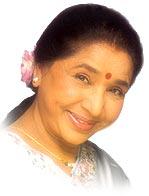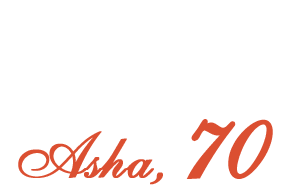
 |
Home | Movies | Slide Shows |
  |
| Asha, 70 | Slide Shows | Features | Your Say! |
|
September 11, 2003
'I think young, my outlook is young'Her voice is a golden strain, the magic of which continues to cast its spell even now. At 70, Asha Bhosle sounds just as beguiling and naughty as she did when she was 17. The singer has just returned from a recent, hugely successful tour of the United States of America, which would exhaust artistes one third her age. She will tour Europe next month. In this interview, Ashaji shares some unforgettable vignettes from her life as singer: Was there a phase in your career when you consistently sang good songs? Yes, the Seventies. Actually, from the end of the Sixties to the end of the Seventies. That was when everybody sang good songs and not just in India. Great music and great songs were happening all over the world. There has never been such a burst of creativity; music has just deteriorated slowly since. Today, if 50 songs are composed, one or two work. In the Seventies, all 50 would work. Woh waqt tha aisa [It was an unusual phase]. Your live shows get a spectacular response. The audience enjoys itself thoroughly. Your shows, to use a typically Mumbaiya term, are completely paisa vasool (value for money). How do you connect so well with your audience? There is a big story behind this. I started singing rock-and-roll songs in the Sixties and Seventies. People were not very happy with me because I used to do this. Us zamane ke logon ne badi gaaliyan di [People mocked me a lot then]. They would not even speak to me properly, saying, 'Yeh kya gaati hai [what is she singing]? Sometimes she sings tamasha, sometimes qawaali, sometimes cabaret.' At that time, cabaret numbers were only picturised on the likes of Helen, Padma Khanna, Jayashree T and Meena T. They wore decent clothes, only their hairstyles were odd. In comparison, today's heroines hardly wear any clothes. Yet, in those days, I had to face a lot of criticism. My song Dum maaro dum was banned by the [Indian] government. It would not be played on radio. And if the film [Dev Anand's Hare Rama Hare Krishna] was shown on television -- at that time, there was only one channel, Doordarshan -- the song would be cut. But God blessed me. A time came when those very songs became popular with the people. The same Asha Bhosle -- who had been vilified at one time -- is so loved today. At that time, youngsters loved me. Today, too, it is the youngsters who love me. Why is that? It is because I sing what they enjoy hearing. When you share your happiness, it only increases. Even in the MTV age, how is it that your songs like Jaanam samjha karo strike a chord with the youth? I think the way I think is young. My outlook is young. Just the other day, someone was talking to me about the Sixties as if it was an era long gone by. For me, the Sixties are not part of the past. I can see it in front of my eyes even now. I don't feel that much time has passed. It's just a way of thinking. Do you feel a sense of satisfaction when your songs turn out well? I have never felt like that. When a song is finally done, there is always the feeling that I could have done this better or I could have added that element or a nuance is missing. I have never personally felt, oh yes, I have sung this song well. When the song is released and people enjoy it and praise it, I forget the mistakes I have made and say, okay, this is not too bad [laughs]. But when I listen to Didi's [elder sister Lata Mangeshkar] songs, I feel they are perfect. When I hear Kishore's [Kumar] songs, I feel he sings perfectly. The day I feel I have sung something perfectly will be the end of me as a singer. You have sung some memorable duets with Kishore Kumar. What was your association with him like? Kishore and I entered the film industry at almost the same time. Actually, I began my career as a playback singer a little before him. Muqaddar was our first film together. I realised one thing about him: this man is very intelligent. He sings very well. And if I had to sing with him, I had to be prepared as a singer. He used to joke a lot, play a lot of pranks. I was new then. Bahut mazaak karte the, koi singer khadi hi nahin ho sakti thi [He used to fool around a lot, no singer could stand in front of him]. I could not figure out what to do. Main chup-chap khadi rehti thi [I used to stand there quietly]. Then I realised that if I did not become like him, I would be eaten alive. Aahista aahista maine use gaane mein jawab dena shuru kiya [I started answering Kishore in my songs]. He began to realise I was giving him tit for tat. He started enjoying it. Sometimes, he would get irritated too. Bahut taane de rahi hai vagera kehte the [He would say I was taunting him]. But we had many good songs together like Haal kaisa hai. Kishoreda was a rather moody person. One had no clue as to when his mood would change because it would change in a flash. But I had learnt what his nature was like, I had learnt everything about him. So it was very easy for me. I would look at the clothes he was wearing and know his mood was bad. So I would be careful, baat karni ke nahin karni [whether I should speak to him or not]? Our songs together would be good because I would understand his mood and behave accordingly. I would never cross my limits. Hadh se zyaada baat hi nahin karni [I would never talk beyond what was necessary]. This is why we worked together so well for so long. He made me sing many of the songs he had composed. He would say he liked only Asha's voice. He used to tell me, 'Bahut sur mein gaati hai [you sing tunefully].' Can you mention some specific songs? The songs in Jhumroo were very difficult to sing. Then, there are songs like Soya hua hai chanda, soye huein hain taare, tu bhi sojaa chand hamare; Haal kaisa hai janab ka; Bhali bhali si ek surat; Piya piya piya mora jiya pukare. When we were recording Piya piya piya, Kishoreda put his hand over my mouth. We were standing in front of each other and, by mistake, I started singing out of turn. I started with haaa… and he put his hand over my mouth. I was going to cut the song at that point, but he said it was okay. And the song was recorded. Those were the days of 'live' recording. Kishore said that in the film, when the girl [Chand Usmani] started singing, he would put his hand over her mouth and it would work. That is what he did in Baap Re Baap. It was really good working with him. It was good till the end. Will you be releasing a new album soon? I want to do a natya sangeet [musical drama] album. I am doing another album in Marathi with Sridhar [music composer Sudhir Phadke's son] as well.
Written by Savera R Someshwar Design: Uday Kuckian |
| Celebrating Asha Bhosle | Tell us what you think! | |